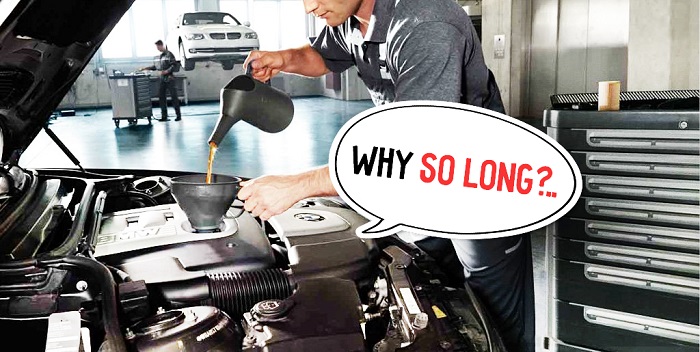
Changing the oil either at the dealership or at home is necessary to properly maintain a car. However, some dealerships and service stations tend to perform an oil change longer than others. In an effort to always enjoy the best and most time-efficient service, we compiled a list of considerations you ought to take before you take your car in for an oil change.
In this article we will discuss:
- What is the purpose of engine oil
- The duration of an oil change at a dealership
- The duration of an oil change at an independent service station
- The duration of an oil change at a quick lube shop
- Oil change schedules
- Different types of oil
- Oil viscosity
- The importance of regular oil changes
- Where to perform an oil change
- Changing the oil yourself
What Is the Purpose Of Engine Oil
Engine oil is a vital component tasked with lubricating, cooling, and cleaning the engine. Oil is intended to cover all the moving parts within the engine which aims to reduce friction in order to prolong the lifespan of internal engine components. Engine coolant is still the most important aspect of engine cooling, but the oil is tasked with cooling down specific areas of the engine.
Engine oil is also used to clean the internal parts of the engine because these are known to accumulate lots of dirt and debris that tend to situate on the internal housing of the engine. This residue sticks to metal surfaces which means that without oil it would clog the engine eventually.
Two additional important tasks of engine oil are preventing corrosion from within the engine and making sure that all the clearances between engine components are well sealed which boosts efficiency and prolongs the lifespan of the engine.
The Duration Of An Oil Change At A Dealership
In most cases, an oil change is performed in under an hour, or more precisely 30-60 minutes depending on the dealership. Once your car gets on the racks, it should take about 15-25 minutes. However, this is only the case if there is nothing else that needs doing on your car. At often times, the service shop will also suggest other repairs, such as changing the wiper blades.
The Duration Of An Oil change At An Independent Service Station
If you opt to change to your oil at an independent service station you should get a fairly similar treatment you would at a dealership. However, independent service stations are not as safe as dealerships are as far as levels of quality execution are concerned. Either way, a dependable independent service station should in essence be as good as most dealerships are.
That being said, sometimes an independent service station may be quicker to replace your engine oil because they are usually not as packed as most dealerships are.
The Duration Of An Oil Change At A Quick Lube Shop
If you are short on time and you want to replace your engine oil as fast as possible you need to consider taking your car through a quick lube shop. They typically carry out engine oil replacements in less than 10-20 minutes which is something you can’t get from a dealership or an independent service shop.
However, this is only possible if the quick lube shop in question has the right type of oil and the right amount which is not always the case. Either way, be sure to inquire about quick lube shops in your area if you want your car back on the road ASAP.
Oil Change Schedules
How often you need to change the oil depends on the oil your car uses and the car you drive. For example, an average vehicle should undergo an oil change every 5000-7000 miles. However, cars that use synthetic oil can last as much as 15000 miles without an oil change. Older cars and cars that experience more stress than others such as commercial vehicles should undergo an oil change every 3000 miles or so.
Different Types Of Oil
As mentioned in the previous paragraph, there are multiple different types of oil, and choosing the right one is crucial for your engine to work at its best. Most modern vehicles use Synthetic Motor Oil because it offers better heat management. Synthetic Blend Motor Oil works best for low temperatures while High-Mileage Motor Oil and Conventional Motor Oil are used for either high-mileage cars or cars with simpler engines.
The best and easiest way one can tell which type of oil your car needs is to look for it in the owner’s manual in the engine lubrication section. If you don’t have the owner’s manual on hand you can try and find one online or inquire about it at your dealership.
Oil Viscosity
While choosing the right oil viscosity for your car you need to consider aspects such as engine load, engine rotational speed, and the operating temperature as associated with a specific time of the year. In essence, there are two types of oil viscosity levels and those are high viscosity and low viscosity grade oils and both of them come with their own sets of benefits of drawbacks.
Low viscosity oils are used for colder climates and heavy engine load exerted by fast rotational engine speeds. A common low viscosity oil is referred to as 0W and 5W oil while high viscosity engine oil is referred to as 10W or 15W oil and should be used during warmer periods of the year and if the engine does not experience heavy load.
The Importance Of Regular Oil Changes
Clean oil is essential for an engine to work at its optimum capacity. Oil is used to lubricate the inner parts of an engine in order to keep those parts cool, prevent friction and clean out any harmful debris and dirt. If you don’t change the oil as recommended by your automaker, sludge will usually form which can speed up corrosion. Besides corrosion, an engine with older oil usually has to compensate for the added friction which causes the engine to wear and to emit increased heat.
Where To Perform An Oil Change
As mentioned previously, an oil change can be performed at a dealership, a service station, at your garage, or many various independent workshops, quick lube shops, and service shops. The best course of action is to take the car to a licensed service shop which usually performs usual maintenance on similar vehicles. Whatever you do, make sure that the oil type used is precisely the one that’s recommended for your vehicle.
Changing The Oil Yourself
Changing the oil yourself is a great way to save time and money. The benefit of this method is that you can change the oil whenever you want, and you don’t need to comply with anyone’s schedule. However, changing the oil yourself usually takes longer if you don’t have all the proper tools and experience. The best option would be to consult yourself with someone with decent experience before you try to do it yourself.
FAQ Section
What Happens If I Don’t Change My Oil Regularly?
Frequent oil changes extend the lifespan of your engine. Therefore, if you fail to change your oil regularly, you are likely to going to end up with a myriad of different engine issues. If you fail to perform your oil changes at this stage you are actively risking the life of your engine so be sure to replace the oil according to your manufacturer’s recommendations.
What Are Quick Lube Shops And Should I Change My Oil There?
Quick lube shops specialize in rapid fluid changes which means that the oil replacement process there should be the quickest. However, this is because most service shops tend to do other maintenance as well. So, if you don’t need any further maintenance, you can change the oil there. However, be vary when scouting for the right quick lube shop because some of them are known to be fraudulent.
Why Should I Change Engine Oil Myself?
Because it saves you both money and time. Be sure to learn the craft beforehand, and always use the right oil viscosity. You should also gain access to a jack stand of some sort because it makes the oil-changing process a lot easier. If you don’t have one, it's better to leave the oil-changing process to a professional or try to borrow one from somewhere.
How Much Does An Oil Change Cost?
An oil change and a filter change should typically run about $35 to $75 if you use conventional oil. Synthetic oil replacements cost more, and you should expect to pay $65 to $150 with labor. Some high-end cars can cost 5 times as much while the Bugatti Veyron is the most expensive car as far as oil changes are concerned because these tend to cost an exorbitant $21k.
Do I Need To Change The Oil Filters While I Change The Oil?
Most automakers recommend that you change the oil filters every second time you change your oil. If you don’t do so your filters will eventually become clogged and the whole point of new engine oil will perish in a few thousand miles time.
About the authors
The CarAraC research team is composed of seasoned auto mechanics and automotive industry professionals, including individuals with advanced degrees and certifications in their field. Our team members boast prestigious credentials, reflecting their extensive knowledge and skills. These qualifications include: IMI: Institute of the Motor Industry, ASE-Certified Master Automobile Technicians; Coventry University, Graduate of MA in Automotive Journalism; Politecnico di Torino, Italy, MS Automotive Engineering; Ss. Cyril and Methodius University in Skopje, Mechanical University in Skopje; TOC Automotive College; DHA Suffa University, Department of Mechanical Engineering






Add comment